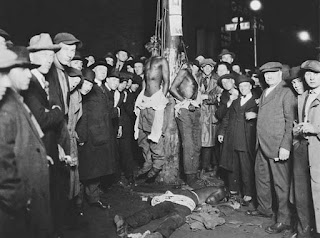En 1939 una encuesta en el sur de EEUU mostraba que 6 de cada 10 blancos aprobaba la práctica de los linchamientos (apaleamientos colectivos que culminan con la muerte normalmente por ahorcamiento) de negros: asesinatos consentidos por las autoridades, legales o socialmente bien vistos, hechos "para dar ejemplo" o "para que (los negros) no se olvidaran de mostrar respeto (a los blancos)".
En esa época la Corte Suprema aprobaba la separación racial bajo el lema: "separados pero iguales".
Las estimaciones más conservadores de la época ofrecen como cifra aproximada unos 3000 linchamientos en el sur del país en las primeras décadas del siglo XX:
 |
| Postal representando el linchamiento de personas de raza negra en Duluth, Minnesota el 15 de junio de 1920 |
Billie Holiday, cuya padre había muerto en 1937 tras ser rechazado por varios hospitales ("no lo mató la neumonía, lo mató Dallas" contaba la cantante de jazz), convulsionó al Cafe Society cantando un tema de Abel Meeropol, profesor judío de origen ruso afiliado al partido comunista que lo compuso (Bitter Fruit) y publicó luego bajo pseudónimo.
Strange Fruit is a song about terrible happenings, alluding to the lynching of black people that were taking place in Southern U.S. since the abolition of slavery and in a time when racial segregation still ruled.
The executions were mostly excused on alleged crimes but it didn't actually needed any kind of reasoning like subordination against separatism but instead were very supported by a white population that despite being a minority was still widely and openly racist.
The song was composed in 1939 by Abe Meeropol at a time were the lynching was still practiced. In the lyrics references to the beauty of the South are opposed to images of executions, describing the bodies as strange fruit hanging from a tree.
Its composer was a Jewish professor of Russian origins and member of the American Communist Party who, impressed by the image of a lynching, wrote a poem entitled 'Bitter Fruit' which later became the song that Billie Holiday included in her repertoire to close her performances in an atmosphere of stillness, silence and low lights.
Southern trees bear strange fruit
Blood on the leaves and blood at the root
Black bodies swinging in the southern breeze
Strange fruit hanging from the popular trees
Pastoral scene of the gallant south
The bulging eyes and the twisted mouth
Scent of magnolias, sweet and fresh
Then the sudden smell of burning flesh
Here is fruit for the crows to pluck
For the rain to gather, for the wind to suck
For the sun to rot, for the trees to drop
Here is a strange and bitter cry
